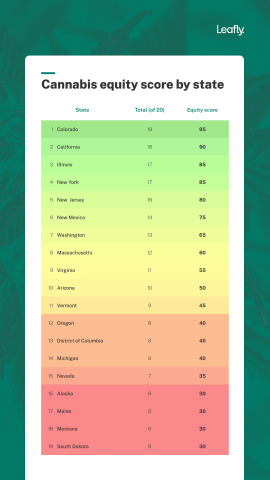Leafly Launches New Report to Score Legalized Cannabis Markets on Social Justice
Leafly Launches New Report to Score Legalized Cannabis Markets on Social Justice
Leafly’s inaugural social equity report uses the Leafly Equity Score to evaluate all 19 adult-use cannabis markets on their strategies to create a fair and equitable cannabis industry, with Colorado, California, Illinois, and New York receiving the top scores.
SEATTLE--(BUSINESS WIRE)--Today, Leafly, the world’s leading cannabis marketplace and resource, released Seeds of Change: Strategies to create an equitable cannabis industry, a first-of-its-kind report that measures states’ efforts in making social equity a foundational part of cannabis legalization.
The Seeds of Change report ranks states according to social justice, equity, and inclusion (SJEI) criteria and also identifies eight distinct SJEI strategies for lawmakers to incorporate within cannabis legalization. This comes on the 50th anniversary of the beginning of the War on Drugs, and at a crucial time when only 2% of America’s estimated 30,000 cannabis companies are Black-owned.
Building on Leafly’s 2021 Cannabis Jobs Report, Seeds of Change examines the legislation of all 18 adult-use cannabis states and Washington, DC, and assigns a Leafly Equity Score based on the incorporation of eight key social justice strategies.
Eight key social justice strategies are used to determine a state’s Leafly Equity Score:
- Mandate automatic expungement of cannabis records
- Establish equitable cannabis licensing systems
- Safeguard rights and accessibility for medical patients
- Allow homegrowing and regulate it reasonably
- Dedicate cannabis tax revenue to healing, not harm
- Gather robust data and share it widely
- Reduce stigma through proactive programs
- Support cannabis career development opportunities
Key Report Findings:
- One in 20 Black Americans hold business equity in any industry, but Black Americans hold business equity in only 1 in 50 cannabis companies.1
- The criminal justice system, historical economic persecution, and healthcare access are the three leading barriers to cannabis opportunity in the US.
- Homegrow and medical cannabis programs are the two most popular cannabis equity strategies employed by states.
- 89% of legal-use states could create more public health resources that help destigmatize cannabis.
- Only 53% of legal-use states are effectively implementing equity-focused licensing initiatives.
- 63% of legal-use states are not reinvesting into disproportionately-harmed communities with their cannabis revenue or taxes.
“Black and brown communities continue to pay the highest price for cannabis prohibition. To lock these same communities out of an industry that is now legal and profitable would add a new era of injustice to decades of pain. Seeds of Change and the Leafly Equity Score show that it doesn’t have to be this way. As new states legalize cannabis, Seeds of Change lays out what we can learn from the most equitable state markets and how it can be used to create thoughtful and intentional policy,” said Janessa Bailey, author of Seeds of Change and creator of the Leafly Equity Score.
“Equity in cannabis isn’t an elusive pipe dream: Seeds of Change lays out eight real strategies that any state can include within cannabis legalization to build an industry that is as accessible as it is profitable. We believe that the cannabis industry’s responsibility to reckon with the enduring damage of the War on Drugs is also our greatest opportunity. If we craft legalization that centralizes social and economic justice, we can create thriving and robust cannabis markets that will fuel real change in our country,” said Yoko Miyashita, CEO of Leafly.
The 2021 Leafly Seeds of Change report includes additional details and data on the eight social equity strategies for cannabis legalization and concludes with an examination of systemic racial discrimination policies in the United States that have prevented the cannabis industry from becoming equitable, namely the failed War on Drugs, generational economic barriers, and the over-policing of communities of color. In addition to the policy areas it outlines, Seeds of Change also provides academic resources for policymakers and engagement opportunities for readers. The full report can be found here.
Methodology
The Seeds of Change report and the Leafly Equity Score are based upon research into existing state cannabis equity policies, national public health objectives, cannabis industry data, and the history of racial disparities in the United States. The report also drew upon interviews with local and national experts in government policy, the cannabis business, and the field of cannabis equity. An individual state's Equity Score is based on its performance within the eight noted categories, including clemency and expungement measures, medical marijuana access, homegrow laws, data collection and publication, and the unique makeup of individual state social equity cannabis programs. Some categories, such as expungement and licensing equity, were given more weight than others, such as data collection. High-impact strategies were given a weighted advantage over strategies that would have a low impact on communities disproportionately harmed by systemic barriers. Select states received partial points for attempts at one or more strategies that are insufficient for solving inequity.
ABOUT LEAFLY
Cannabis marketplace Leafly will help more than 120 million people discover cannabis this year. Our powerful ecommerce tools help shoppers make informed purchase decisions and empower cannabis businesses to attract and retain loyal customers through advertising and technology services. Learn more at Leafly.com or download the Leafly mobile app through Apple’s App Store or Google Play.
1 Source: McKinsey & Company, Cannaclusive, and Whitney Economics
Contacts
Laura Morarity
pr@leafly.com

